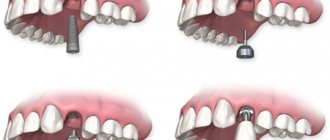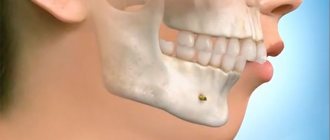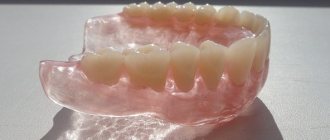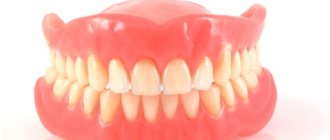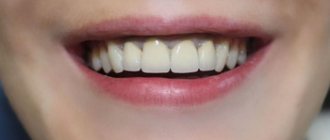Home / Complaints, courts, consumer rights / Services and consumer protection
Back
Published: September 30, 2018
Reading time: 6 min
4
736
Installing a filling on a tooth or prosthetics are the most popular dental services in Russia. Before dental interventions, it is worth clarifying what warranty period applies to the filling or prosthesis.
- Legal standards
- Warranty period for dental services
- Types of warranty obligations
- In what cases and how are dentures and fillings repaired or replaced under warranty?
During this period, the client of the dental clinic has the right to have defects eliminated free of charge.
Warranty
All guarantees provided by the dental clinic can be divided into two types. The first will include warranty obligations that relate directly to the process of providing services. But the second type of guarantee already covers the quality and durability of the work performed.
Let's consider what belongs to the first group.
A high-quality dentist’s workplace is the clinic’s guarantee
This type of obligation includes all aspects related to human security, namely:
- Compliance with all standards for the use of aseptics and antiseptics.
- Compliance with safety precautions when using various materials, tools and drugs. For each item used, the dentist must have a certificate in accordance with the requirements of the legislation of the Russian Federation.
- The dentist must have the appropriate education and qualifications. And also all additional employees related to dental activities must have certain certification.
- The procedure and scope of provision of services are carried out strictly in accordance with the rules that apply on the territory of the Russian Federation.
- All services are carried out after informing the patient and obtaining his consent.
- Reasonable risk must be taken. This is when the risk to the patient’s health when performing a service does not exceed the expected benefit from obtaining the result.
The second group of guarantees is aimed at the following:
- provision of safety during the assigned service life in relation to the patient and the people around him;
- The mechanical functions of the product must be maintained during its direct use;
- preservation of the biological and aesthetic functions of the product;
These two types of guarantees differ significantly from each other.
In the second case, only the dentist providing the service is responsible. If there are defects, he can simply correct his shortcomings.
But fulfillment of the first group of guarantees is an absolute requirement that must be unquestioningly fulfilled in accordance with regulations. If they are deliberately violated, the company will be subject to malfeasance.
The quality of the filling is a doctor’s guarantee
What is prosthesis correction and when should it be done?
After applying removable dentures in the oral cavity, as a rule, pain appears in some areas underneath. This is due to the inevitable gradual subsidence (pressure) of the removable denture on the mucous membrane. This factor cannot be fully taken into account when designing these orthopedic structures, therefore, correction is necessary to eliminate unpleasant sensations. It consists of “undermining” the dentures in those areas where it presses on the oral mucosa.
The first correction must be carried out the next day after the start of using dentures. The next 3-4 corrections must be carried out over a period of one and a half to two weeks as necessary. You may need more visits to the dentist after completing your work (up to 10).
In case of severe pain, you need to remove your dentures and put them in a special container or glass of water. Before going to the doctor for correction, you must wear dentures and walk around with them for at least 3-4 hours. This will allow the doctor to see a clear imprint on the mucous membrane and correct only the place that is rubbing the gum. Bringing a denture in your pocket and pointing your finger in your mouth is useless. In removable dentures, every centimeter, and sometimes even a millimeter, of the supporting surface is of great importance. If the correction is inaccurate, the fixation of the prosthesis may be impaired. This is exactly what happens if you try to grind or file dentures yourself. After correction (adjustment) of removable dentures, you must not use them for 1 day. During this period (during the healing period of the namin), it is advisable to rinse your mouth and make baths (hold the solution in the mouth at the site of the namin) with herbal decoctions. Use a decoction of chamomile flowers, oak bark, etc. For example, take 0.5 tablespoons of dry oak bark, brew in one glass of boiling water, cool, apply the decoction 3-5 times a day. You can also use medicines, for example Kamistad gel, sold in pharmacies.
Feel free to visit your dentist for adjustments. Removable dentures, even if they are made in the most careful manner, require correction. Even if you do not experience any pain or discomfort, you should visit the dentist for an oral examination.
WARNING : Do not attempt to straighten dentures yourself with a file or any other tool. This can lead to breakage of the prosthesis and disruption of its fixation. Moreover, after such “repairs” it is no longer possible to do anything with the prostheses in the clinic. As a result, all that remains is the manufacture of new orthopedic structures.
Guarantee period
There is a point in the Law “On Protection of Consumer Rights” that states that “the contractor has the right to establish a warranty period for the work.” This statement indicates that the period for providing a guarantee is only a right, not an obligation.
But this law contains a clause according to which dental companies are responsible and must provide a guarantee for dentures and dental treatment with the installation of fillings.
If a tooth was filled in dentistry and defects subsequently appeared, the patient has the right to the following:
- free elimination of all defects;
- reducing the cost of services provided;
- re-doing the work;
- compensation to a person for losses he incurred while correcting deficiencies in another clinic;
- accept the patient’s refusal of the services provided and pay compensation for poor performance of their obligations.
The guarantee is a period of time during which the organization bears full responsibility for the service performed.
Compulsory medical insurance seals are covered by a guarantee
What complications can dental prosthetics cause?
There are cases when, at the stage of final fixation and installation of crowns, patients experienced certain complications. I propose to consider what complications people may encounter after installing permanent crowns on their teeth.
- Prosthetic stomatitis. This complication occurs as a result of strong pressure from the crown on the surrounding soft tissue. The consequence of such pressure can be the death of soft tissue at the point of contact with the prosthesis due to a violation of the circulatory system.
- Caries. Carious deposits may begin to develop due to the fact that the supporting teeth were not treated before prosthetics. In addition, caries is formed due to poor daily oral hygiene of the patient.
- Allergic reactions. After the crowns are installed, the patient may begin to feel some discomfort and burning in the mouth. Severe rashes may appear on the mucous membrane. This indicates the onset of an allergic reaction that began after the crown was installed.
- Galvanic syndrome. Due to the fact that the crowns in the patient's mouth are made of different types of material, galvanism develops - an electric current in the mouth.
If you notice any complications or discomfort, make an appointment with your doctor immediately. A prolonged absence of examination and taking the necessary measures can cause tooth loss. When visiting a doctor and discovering various types of complications, the dentist will remove the crown and, after carrying out the necessary procedures, will be required to re-install the crown on the tooth.
Of course, the option of prosthetics, as well as the material from which the prosthesis will subsequently be made, is chosen directly by the patient himself. However, to prevent complications, it is necessary to take into account the point of view of the specialist involved in prosthetics. If you strictly follow all the established rules and doctor’s recommendations, you will be able to use crowns for a long time, which will give your smile an aesthetic appearance and restore your teeth to their lost functions.
Be healthy and smile more often!
Warranty periods and service periods for work and services in therapeutic dentistry begin to apply from the moment the treatment of a particular tooth is completed. Signs of the end of treatment are: - in the treatment of caries - a permanent filling is placed; - in the treatment of complications of caries (pulpitis and periodontitis) - permanent filling of root canals and covering the tooth with a crown. Note: 1. These terms are recommended for patients with single caries and multiple stabilized or slow-moving caries. With KPU (carious-affected, filled, extracted) teeth 13-18, the terms are reduced by 30%, with KPU more than 18, the terms are reduced by 50%. 2. In case of unsatisfactory oral hygiene, the warranty and service periods are reduced by 70% 3. If the schedules of preventive examinations and hygiene visits provided for in the treatment plan are violated, the warranty is canceled. 4.
Consumer rights
When carrying out a paid service for treating caries and installing a filling, many are interested in the question of how much the guarantee is for the filling. The answer to this question should be found in the service agreement.
Let's look at what problems should be corrected under warranty in a dental clinic. They are usually divided into essential and non-essential.
Minor shortcomings include:
- destruction of the edge seal;
- modification of the shade of the filling along the outer edge;
- recurrence of caries along the edge of the filling.
Such deficiencies refer to a violation of the aesthetic function of service provision. They do not cause inconvenience when biting and chewing food. They are usually corrected immediately, without leaving the dental chair.
The doctor must replace a poor-quality filling
The following are considered significant shortcomings:
- loss of filling material;
- loose condition of the filling;
- chipping of a small area of the tooth crown.
Such shortcomings, in addition to disruption of aesthetic function, imply the impossibility of using the tooth for its intended purpose. This occurs after complete or partial destruction of the dental filling.
The dental company eliminates this deficiency if the warranty period has not expired.
Dental clinic "median"
Let's give a simple example: if the manufacturer of an orthopedic dental structure determines its approximate service life of 15 years, this does not mean at all that the clinic where the structure was installed is obliged to provide free services to the patient during this time. The clinic is responsible only for the work of its medical staff, so in this example the concept of “warranty period” comes into play - it will range from 1 to 3 years.”
A warranty case is a situation in which a product (filling, prosthesis, implant) fails during the warranty period. If this happens, the patient has the right to demand that the clinic fulfill its obligations - free replacement of the filling, restoration of the dental crown, repair or replacement of the brace system.
One of the few areas of dentistry for which clinics do not provide any guarantees is surgery.
Replacement under warranty
If after treatment a person’s filling breaks or falls out, but the warranty has not yet expired, you should demand that the problem be corrected. To do this, you need to call the reception of the dental company where the treatment was performed and make an appointment, telling about your problem. It is advisable that the person retains the contract and the receipt.
At the appointment, the doctor will examine the tooth and inform the patient whether the current situation is covered by the guarantee. If treatment was refused, but the patient is sure that the trouble arose due to poor-quality service, examinations can be carried out. You will have to do it at your own expense, but if the result is in favor of the patient, the clinic will have to pay for all services.
If, after the examination, dentistry does not want to correct its mistakes, then you should seek help from a medical lawyer. With its help, an application will be drawn up to request a medical record from the clinic. It is drawn up in two copies and one is signed by a representative of dentistry stating that the document has been approved.
After this, the patient goes to any other clinic and asks the doctor to describe the oral cavity. This procedure is necessary to file a claim. After this, you can begin dental treatment.
Secondary caries due to the fault of the doctor
When filing an application with the court, you must provide all receipts and demand compensation for moral damages.
How to protect yourself from medical mistakes
Poor-quality dentures are, as a rule, evidence of the unprofessionalism of the doctors who created and installed them. This may also indicate that low quality materials were used in their manufacture. However, the problem can often be avoided if the patient initially goes to a clinic with a good reputation, where experienced doctors work and has its own dental laboratory equipped with the latest technology. We also provide a guarantee of work, compliance with ethical standards and legislation.
When contacting dentistry, do not be shy or lazy to request quality certificates and licenses. Make sure that all doctors have specialized education and qualifications: for example, prosthetics should be performed by an orthopedist, and it’s good if he is also a gnathologist, then the prosthetics will not only be beautiful, but also truly functional.
Be sure to conclude an agreement with the clinic, which will spell out specific services, deadlines for their implementation, responsibilities of the parties and warranty obligations. If you do not have the signed original contract in your hands, then it will be very difficult and sometimes even unrealistic to prove something later in the event of problems.
Remember that the warranty and the service life of the prosthesis are two completely different things. The guarantee is given for the prosthesis itself (that is, relatively speaking, for the material), as well as for the work of doctors, that is, for the service itself. But the service life is determined by the qualities and characteristics of the materials from which the dentures are made. If it is plastic, then the service life does not exceed 3 years, if it is zirconium dioxide, then it can be more than 15 years. The actual duration of operation, as a rule, exceeds the warranty period.
You have the right to demand compensation for damage, treatment of the tooth, alteration of the structure, or return the money for it only when, within the specified warranty period, it turns out that due to the fault of the dentists, you received poor-quality dental prosthetics. If no guarantees are specified, then the law stipulates that claims for such services can be made no later than 2 years from the date of their provision.


